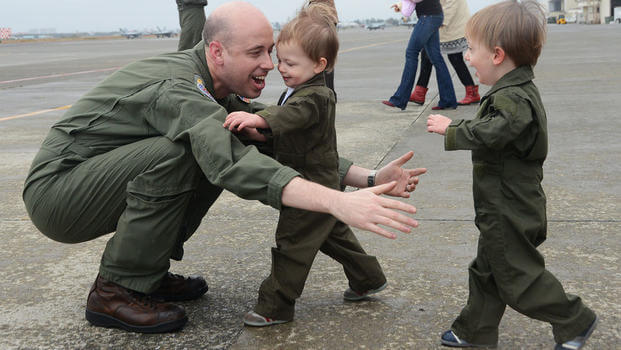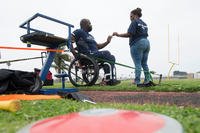Experience has shown that virtually all military members returning from deployment, and their household members, experience at least a little uneasiness as they readjust to their normal environment. Changes, some more subtle than others, have taken place during the deployment for the military member, their family and there friends and colleagues. To successfully cope with change requires that we make corresponding adjustments in attitude, thought and behavior.
As you transition back to your predeployment environment, whenever you begin to feel angry or frustrated, ask yourself, “How realistic are my expectations in this situation?” “Am I giving myself, and others, enough time and space to adjust?”” Am I trying to force readjustment to happen rather than being patient and allowing it to happen at a comfortable pace?”
Remember that readjusting to home life and work life is a process, not an event. As you reintegrate into your family, work and social environments, it makes sense to allow yourself and others the appropriate time and space. In so doing, you will probably find that in a few weeks everything is back to a comfortable pattern again.
In the unlikely event, however, that after two to four weeks you are consistently feeling sad, having marital difficulties, problems with sleep or appetite, difficulty in concentration, using alcohol excessively or any other form of significant discomfort, please seek assistance. There are numerous sources of help for families that are adjusting to reunion after deployment. They include the Family Support Center, chaplains, spouses clubs and local churches.
For those families who need more intensive professional help, counseling services are available through Mental Health Clinics; and Family Advocacy Programs or through the TRICARE Service Center (child therapy and family therapy not involving domestic abuse).
Tips for Returning Servicemembers:
1. Plan on spending some time with the entire family doing family things, but be flexible if teens have other plans.
2. Show interest and pleasure in how your family members have grown and mastered new skills in your absence and let them know you are proud of them. Comment on positive changes.
3. Expect it will take a little time to become re-acquainted with your spouse. Be sure to tell them just how much you care about them. Make an effort to do the little romantic things -- a single rose, a card, etc. shows them they are in your thoughts.
4. Resist the temptation to criticize. Remember that your spouse and co-workers have been doing their best to run things while you were gone. Give them credit for their efforts, even if their way of doing things is different from yours.
5. Take time to understand how your family may have changed during the separation. Go easy on child discipline -- get to know what new rules your spouse may have set before you jump into enforcing the household rules. If you are a supervisor, do that same with our subordinates.
6. Don't be surprised if some family members or co-workers are a bit resentful of your deployment. Others often think of the deployment as more fun and exciting than staying at home -- even if you know otherwise.
7. Infants and small children may be shy or even fearful around you at first. Be patient and give them time to become reacquainted.
8. Resist the temptation to go on a spending spree to celebrate your return. The extra money saved during deployment may be needed later for unexpected household expenses.
9. Most importantly, make time to talk with your loved ones. Your spouse and each child need individual time and attention from you. Remember, focus on the positives and avoid criticism.
Tips for Military Spouses:
1. Do something special to welcome your spouse home -- help the children make a welcome banner, make your spouse's favorite dessert, etc., but be understanding and flexible if your spouse is too tired to notice.
2. Give your spouse time to adjust to being home. Don't tightly schedule activities for them. Don't expect them to take on all their old chores right away. Understand that your spouse may need time to adjust to a different time zone, a change in food, etc.
3. Plan on some family togetherness time. Suggest a picnic or a special family meal. Time together helps the returning spouse to get back into the rhythm of family life.
4. Be patient and tolerant with your spouse. He or she may not do things exactly as before. New experiences during deployment may bring changes to attitude and outlook. Your spouse may have some initial discomfort adjusting, but this doesn't mean your spouse is unhappy with you or the family.
5. Stick to your household budget. Don't spend money you don't have on celebrating your spouse's return. Show you care through your time and effort, not by how much you spend.
6. Don't be surprised if your spouse is a little hurt by how well you were able to run the household and manage the children without him/her. Let him/her know that your preference is to share family and household responsibilities no matter how well you did on your own.
7. Stay involved with your children's school activities and interests. Don't neglect the children's need for attention as you are becoming reacquainted with your spouse.
8. Stay involved in your own activities and interests, but be flexible about making time for your spouse.
9. Don't be surprised if children test the limits of the family rules when your spouse returns. It's normal for children to want to find out how things may have changed by acting up a bit. Consistent enforcement of family rules and even-handed discipline are key to dealing with acting-out.
Adapted from “Return & Reunion” produced by Air Combat Command Family Programs.
Keep Up with the Ins and Outs of Military Life
For the latest military news and tips on military family benefits and more, subscribe to Military.com and have the information you need delivered directly to your inbox.






















